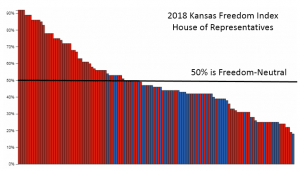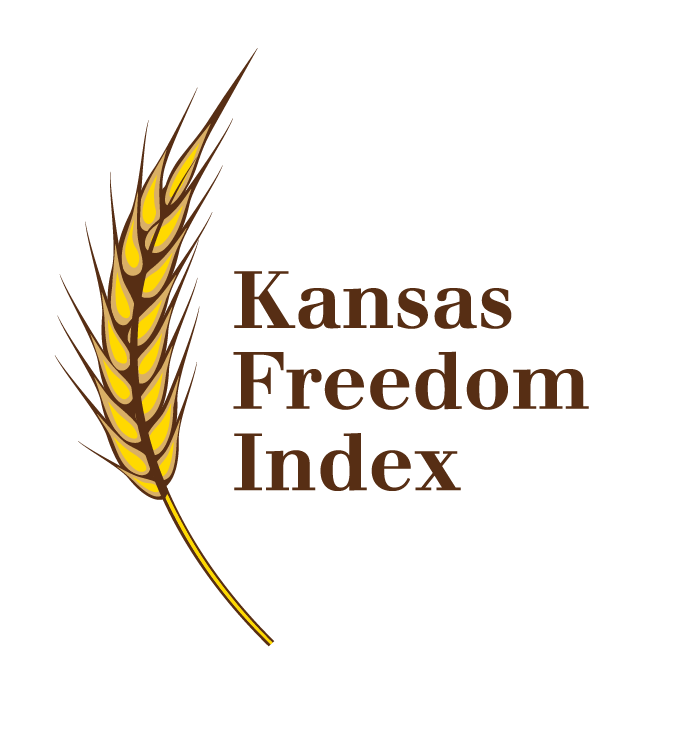Representatives and Senators clearly have a voting record that demonstrates their personal support for freedom but that, apparently, has very little to do with their party registration. Republicans and Democrats are all over the map on whether they do, or do not, support educational and economic freedom. In other news, water is wet.
The 2018 Kansas Freedom Index highlights many of the votes from the 2018 legislative session and how those votes bear on educational and economic freedom. This guide is a one-stop shop for the impact that legislative votes have on your ability to run your business, live your life, and raise your family as you see fit. It is the product of nonpartisan analysis, study, and research and is not intended to directly or indirectly endorse or oppose any candidate for public office.
From federalism to student-focused education. From taxes to free speech. From regulation to spending discipline, the 2018 KFI takes account of whether rhetoric matches the actual voting records of legislators.
CLICK HERE to check out how your legislator views educational and economic freedom.
50% is considered neutral on the Index…meaning a legislator with a score of 50% voted for freedom as often as they voted against it. Someone with a 100% score would always vote in support of freedom, 0% the opposite. By way of reference, in 2018 three legislators shared the highest score at 91.7% and one legislator scored the lowest at 18%
Support of these freedom-related issues is not a matter of party affiliation. For example, of the 85 Republicans in the House, 19 of them scored 75 percent or better but 36 of them had negative records on freedom with scores below 50 percent. In fact, six of the seven worst scores in the House belong to Republicans.
 Consider the following example of how a vote is scored: Senate Bill 301 (SB 301) was approved by the Senate but wasn’t considered in the House, so only Senators were scored on the bill. It would have mandated that hunting guides register with the state and pay an annual $100 fee. The Freedom Index score was negative one (-1) for creation of the registration requirement and negative one (-1) for creating a new fee; total score assigned would be negative two (-2). A legislator voting against this bill would be awarded positive two (+2) points. Conversely, a legislator voting for the bill would be awarded negative two (-2) points.
Consider the following example of how a vote is scored: Senate Bill 301 (SB 301) was approved by the Senate but wasn’t considered in the House, so only Senators were scored on the bill. It would have mandated that hunting guides register with the state and pay an annual $100 fee. The Freedom Index score was negative one (-1) for creation of the registration requirement and negative one (-1) for creating a new fee; total score assigned would be negative two (-2). A legislator voting against this bill would be awarded positive two (+2) points. Conversely, a legislator voting for the bill would be awarded negative two (-2) points.
This raises a simple but fundamental question of economic regulation and how bills are scored as part of the KFI. Why shouldn’t hunting guides** be forced to register with the state? Hunting involves some kind of firearm or bow – any falconers will forgive this generalization – autumn weather can be dicey in Kansas, property lines and species can be hard to discern as animals move around their habitat. All of this, one could argue, all but mandates that hunters and their guides be more-closely watched. Plus, what’s a small fee and filling out one form…hardly onerous.
This logic gets to the core of who KPI is and WHY we do the Freedom Index in the first place.
The answer is that these questions are best left to individuals to sort out. A hunter going afield has the greatest incentive to make sure they stay safe and that their companions, or guide, do as well. With a lifetime Kansas hunt/fish license selling for nearly $1000 plus seasonal tags the individual hunter also has every incentive to not have that taken away, a common penalty, for violating hunting regulations. Trespassing is a serious crime as well. Plus, much of rural Kansas benefits greatly from out-of-staters coming to Kansas buying tags, eating dinner, and booking a hotel or lodge visit. This brings important dollars into rural economies and helps people enjoy the outdoors. SB 301 may appear like a small burden but an outfitter may just as easily direct their clients to deer or pheasants in another state if they have to add one more item to their to-do list before heading to Kansas each fall.
The punchline is this – requiring someone to register and pay a fee interferes with their right to earn a living. It makes it harder for consumers (i.e., hunters under SB 301) to obtain a needed service. Plus, paying a fee to government doesn’t make the guide more effective or improve safety; it just makes money for government.
You can view the 2018 Freedom Index and read the Methodology here. Most of the information can be exported to Excel and a PDF listing will be available for download shortly. E-mail or give us a call with any questions or to request that we drop a printed version in the mail. Taken as a whole, the KFI can help Kansans achieve a better understanding of how much folks in Topeka trust you to make the economic and educational decisions for yourself. It is the product of nonpartisan analysis, study, and research and is not intended to directly or indirectly endorse or oppose any candidate for public office.
** A hunting guide or outfitter provides a variety of services to hunters such as lodging, meals, gaining access to private property, scouting and tracking species, processing/shipping meat or trophies, etc.





